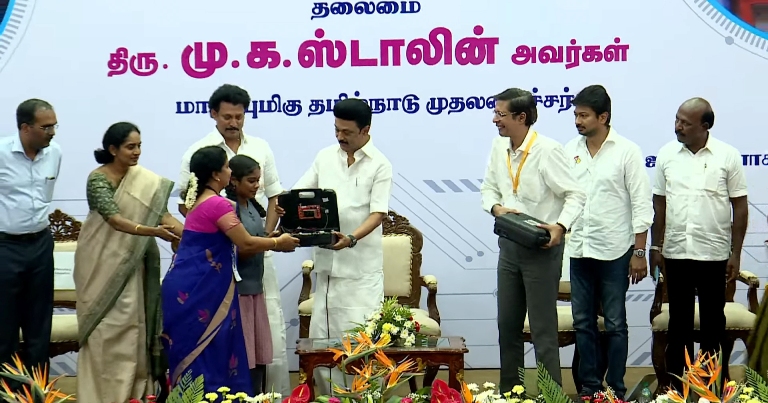
Objective of this IIT Madras STEM Outreach program is to motivate Govt. school students to take up a career in the domain of Semiconductor Technologies
Chief Minister of Tamil Nadu, M.K. Stalin on April 5 inaugurated an initiative of Indian Institute of Technology Madras (IIT Madras) to connect one lakh Government School students in Tamil Nadu studying in rural locations to electronic science. Part of the ‘Anaivarukkum IITM’ (IITM for all) initiative, this outreach program on STEM aims to connect with one lakh students every year in Tamil Nadu studying in rural locations. It is intended to motivate them to take up a career in the domain of semiconductor technologies through the lectures and hands-on experience imparted to students of classes IX, X, XI, and XII.
As part of this endeavour, he also distributed electronic kits developed by IIT Madras to the Government school students in the presence of Anbil Mahesh Poyyamozhi, Minister for School Education, Government of Tamil Nadu, Prof. V. Kamakoti, Director, IIT Madras, and other dignitaries, at an event held on IITM Campus.
Through this initiative, 252 government schools in rural locations were identified for getting the electronic kits developed by IIT Madras. The Institute has already trained two teachers from each school to teach the children. To support the teachers, India Literacy Project (ILP India), a non-profit organization, has come forward to deploy teachers to support them in electronics teaching and provide science kits (at least 10 kits to each of the 252 schools) through IIT Madras. The teacher volunteers from ILP will also support the teachers in conducting science kit experiments from class 6th to 10th Standard.
The students will get a complete hands-on experience in addition to theoretical knowledge. At the end of the modules of each section, a short test will be conducted. Eligible students would be provided with a certificate from IIT Madras. The set of experiments taught to students, at the school level, will enable children to think beyond and can design their own thought process to design circuits for any application, ranging from their day-to-day use / to entrepreneurs / startups.
In addition, students choosing electrical / electronic engineering as a branch of study could carry out experiments with confidence and read electrical/electronic subjects up to the second year, comfortably without any trouble.
IIT Madras has launched two highly flexible B.S. programmes – Data science and Electronic Design, which are largely offered in online mode. By inspiring children through the teaching of science and electronics with a due emphasis on experimental learning, would form a perfect platform and enable children to learn about various emerging educational and research programs at IIT Madras. It can fuel their passion to join IITM for regular programmes or to opt for the online programmes, irrespective of the course they pursue after XII standard.
Addressing the event, Chief Minister Stalin said, “As many as 1,000 students (500 male and 500 female) studying Standard X will be chosen for this scheme. Guidance will be provided to the students by connecting them to higher education insitutions such as IIT Madras. A stipend of Rs. 1,000 will be provided every month until they finish their Class XII. Students selected under this scheme will also get Rs. 12,000 as stipend annually during their under-graduation and post-graduation.”
The advancement of technology especially in Semiconductor Manufacturing and Information and Communication technology is essential to provide solutions to problems faced in several domains such as health care, clean energy, and the environment, among others. This project of IIT Madras is a humble effort to inculcate scientific and technological fervors amongst the young students studying in rural areas and kindle their passion for creative and innovative thinking in the various scientific and technological fields, relevant to societal issues.
Delivering the Keynote Address, Anbil Mahesh Poyyamozhi, said, “Each one of these kits will enable students to perform multiple experiments. The 252 teachers being trained as part of this initiative will train one lakh students. Electornics is the foundation for many industries now and this initiative will go a long way to enable Tamil Nadu to become a $ 1 Trillion economy.”
Presiding over the event, Prof. V. Kamakoti, Director, IIT Madras, said, “This initiative will greatly help the students of Government School students. It was formulated with the help of Department of School Education… We have covered all districts of Tamil Nadu under this initiative. Students clearing this program will get certificates from IIT Madras. Students can perform 100 experiments on the Electronic Kits, which were developed by IIT Madras and being given to students. We will also be giving videos prepared in Tamil and English. Students can also use the kits to work on projects…We assure everyone that we will work towards making Tamil Nadu the #1 State in Electronics.”








